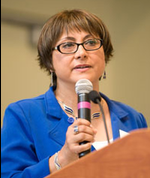This article appeared in the Indy Star May 14th:
 The Arizona governor has just signed yet another controversial bill banning ethnic studies courses from being taught in public schools. What is wrong with this picture? Even the United Nations is getting involved.
The Arizona governor has just signed yet another controversial bill banning ethnic studies courses from being taught in public schools. What is wrong with this picture? Even the United Nations is getting involved.
Most American universities offer some kind of ethnic studies. Indiana University has wonderful programs such as Latino Studies, Latin American and Caribbean Studies, African-American Studies, Middle Eastern Studies, and so on. These programs are very important to all the students. They bring awareness and understanding among cultures. They provide a broad treatment of the various forms of diversity common in today’s schools and universities.
Ethnic studies help students who belong to an ethnic group become more aware of who they are. Students who don’t belong to the particular ethnic group being studied are able to learn about another culture with its traditions, ideas, history and geography. This exposure allows students to become more open-minded about cultures other than their own.
Sociologists who study culture in terms of various competing social groups within a society have developed a number of concepts that are helpful in understanding many terms used in ethnic studies programs. Five of these most commonly used to describe social groups, which share important cultural elements but are smaller than a whole society, are subculture, micro culture, ethnic group, minority group, and people of color.
The term ethnic group refers to groups that share a common heritage. When people define themselves as African-American, Hispanic-Latino, Jewish or Polish, they are identifying with a group of people who share common histories, ancestries, celebrations and traditions, who enjoy similar foods, and who might speak a common language (other than English). Consequently, people can live in one nation and claim one nationality, while maintaining ancestral ties to one another.
There is no need to be afraid of ethnic studies programs since they encourage all students to become better people by offering an understanding of what diversity is all about. It is about teaching all students in a society that is growing more diverse each year. It is about changes in schools and in the larger society in which those schools are embedded. It is equally about change within oneself, for change in the larger dimensions of society cannot occur without significant changes in one’s own perception, attitudes and skills.
I graduated from Indiana University’s Latino Studies program, and most of the classes I took were related to the history of education, Latino/Hispanic literature, citizenship, identity, etc. These classes helped me appreciate all cultures. I learned about social justice on the one hand and about inequities in education on the other. Ultimately, these culture studies courses taught me to appreciate the history of this great country.
